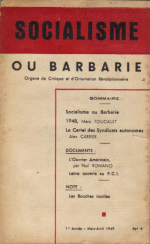Latest entries
Ngô Văn
In the Crossfire
Adventures of a Vietnamese Revolutionary [en]
Although the Vietnam War is still well known, few people are aware of the decades of struggles against the French colonial regime that preceded it, many of which had no connection with the Stalinists (Ho Chi Minh’s Communist Party). The Stalinists were ultimately victorious, but only after they systematically destroyed all the other oppositional currents. This book is the story of those other movements and revolts, caught in the crossfire between the French and the Stalinists, told by one of the few survivors.
Marcel van der Linden
Socialisme ou Barbarie
Dari LEFT HISTORY 5.1 (1997). Alih bahasa oleh Yerry Nikholas. Pemeriksa aksara oleh Reuben Augusto [id]
Ameyuri Ringo
Kanno Sugako
“Anda mungkin bisa hidup seratus tahun lamanya, namun apalah artinya hidup tanpa kebebasan–kehidupan perbudakan?” [id]
Kostas Gournas, Revolutionary Struggle
Athena: Surat Deklarasi Kepada Pengadilan oleh Kostas Gournas, anggota Revolutionary Struggle
Pada bulan April 2010, bersama dengan kamerad-kameradku, Pola Roupa dan Nikos Maziotis, kami mengklaim pertanggungjawaban politik terkait keterlibatan kami di Revolutionary Struggle (Epanastatikos Agonas - bahasa Yunani - penj). Kami mengaku bangga dengan organisasi kami dan mendiang kamerad kami, Lambros Foundas, yang terbunuh oleh pasukan polisi bersenjata saat terjadi pertempuran di Dafni. [id]
Individualist Network, Palang Hitam Indonesia
Seek and Destroy Eco-Extremism Everywhere: A Joint Statement of Individualist Network and Indonesian Anarchist Black Cross
[en]
Anonymous
Why Not To Trust Your School
[id]
Tugas pertama pendidikan publik dalam masyarakat kapitalistik adalah mengajarkan siswa untuk “menghormati otoritas.” Tugas kedua dari pendidikan publik di dalam masyarakat kapitalis adalah untuk merampok individualitas kita, sehingga kita akan tunduk pada apa yang diperintahkan kepada kita dan membuat kita tidak mengejar lagi sebuah ide, keinginan, atau bakat kita sendiri. Tugas ketiga pendidikan publik di dalam masyarakat kapitalis adalah resimentasi. Tugas keempat pendidikan publik di bawah kapitalisme adalah untuk mencegah perbedaan pendapat. Tugas kelima dari pendidikan publik dalam masyarakat kapitalis adalah untuk mendorong keegoisan. Tugas keenam dari pendidikan publik dalam masyarakat kapitalis adalah membagi kita berdasarkan gender dan kelas sosial. Tugas ketujuh dari pendidikan publik dalam masyarakat kapitalis adalah membujuk kita untuk mempertahankan sistem yang mengeksploitasi kita.
Jhon Ajat
Pemerintahan Masa Depan dalam Pemikiran Noam Chomsky
[id]
Kepada hari ini, Chomsky menyampaikan bahwa, kita memiliki sumber daya teknis dan material untuk memenuhi kebutuhan hewani manusia. Namun, kita belum mengembangkan sumber daya budaya dan moral atau bentuk organisasi sosial demokratis yang memungkinkan penggunaan kekayaan dan kekuasaan material secara manusiawi dan rasional. Bisa dibayangkan bahwa cita-cita liberalisme klasik, seperti yang diekspresikan dan ditumbuhkan dalam bentuk sosialisme libertarianya, dapat tercapai. Dengan demikian, hanya dengan gerakan revolusioner yang populer, yang berakar dalam strata populasi yang luas, dan berkomitmen untuk menghapuskan lembaga-lembaga yang represif dan otoriter, negara dan swasta. Menciptakan/penciptaan gerakan semacam itu adalah tantangan yang kita hadapi kini apabila ingin membebaskan diri dari barbarisme kontemporer.
Peter Gelderloos
Quico Sabaté: Anarkistang Gerilya
[tl]
Noong ika-lima ng Enero 1960, binaril ng mga pasista ang Katalanong na gerilyang anarkista si Quico Sabaté at sa wakas, siya’y namatay pagkatapos ng tatlumpung taon ng pakikipag-laban sa kapitalismo.








